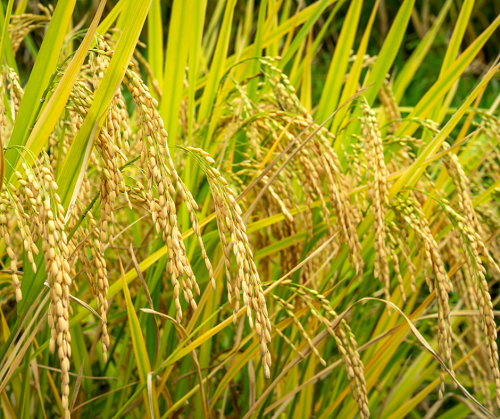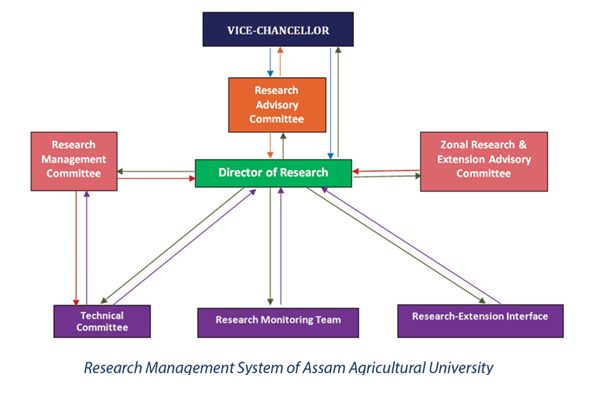

Agriculture in Assam is considered as the most valued enterprise playing a pivotal role state’s economy contributing about 19% to the Gross State Domestic Product (GSDP) during 2016-17 engaging about 70% of the population directly or indirectly. Assam Agricultural University (AAU), being the premier institution of North Eastern India has been targeting to produce globally competitive human resources along with pursuing agricultural researches in frontier areas and disseminating generated technologies to the deepest corners of the state to bring sustainability in farming and food security to the ever-growing populations. Emphasis on agricultural development in Assam was also put forwarded during pre-independence era through establishment of Upper Shillong Experimental Farm (now in Meghalaya) during 1897, however, real progress in terms of agricultural research in Assam was took place through Rice Experimental Stations at Karimganj and Titabar during 1913 and 1923, respectively.
The Research & development Cell is headed by the Director of Research (Agri) and is functioning under the Directorate of Research (Agri), AAU, Jorhat and is functioning from the Technical Cell. The cell facilitates planning, approval, monitoring and evaluation of the basic, applied and adaptive research and development programmes relevant to the needs of the farmers and entrepreneurs of Assam through various committees in meetings. The Research Advisory Committee (RAC), headed by the Vice Chancellor, AAU is the apex body for approving the activities and functioning of the cell. The RAC includes representatives from line departments of Govt. of Assam as well as subject experts to share thoughts and infiormations to fix the research agenda of the university, besides deciding the priority areas of research, addressing the short term and long-term goals of AAU. The research agenda is proposed through the Zonal Research & Extension Advisory Committee across six agroclimatic zones and finalized in the theme-wise (Crop Improvement, Crop Management, Plant Protection, Horticulture and Plantation Crops, Social Science and Community Science) technical committee meetings and approved in the plenary session for Kharif and Rabi seasons. The recommendations approved in the plenary session are forwarded to the Pre-package meeting and finally adopted in the Package of Practices of crops for Kharif, Rbi and Horticultural crops as well as Organic PoP for selected crops. The field officials and district and state heads of relevant line departments, farmers, entrepreneurs and other stakeholders participate in respective forum during formulation and approval of the research programme and recommendation. The Package of Practices for Kharif, Rabi and Horticultural crops as well as Organic PoP for selected crops are jointly published by the AAU and Department of Agriculture, Government of Assam and the soft versions are available through university website (http://aau.ac.in) and updated from time to time.
The consultancy projects are important due to urgent need of studying new technologies developed elsewhere and testing in Assam condition and various agencies approaches for studying their products/technologies from time to time. Many of these projects are undertaken by the university through either directly through this cell or through MoU/MoA after proper vetting from the IPR Cell, AAU and approval from the competent authority. After completion of each project, the results are shared with the respective agencies by following proper official formalities. The cell is responsible for proper indexing and record keeping of the consultancy projects (List of crop variety testing projects enclosed). The guidelines for undertaking and consultancy project is governed by the Assam Agricultural University Guidelines for Consultancy Services which is available in the aau website (http://aau.ac.in).
For upscaling of AAU developed technologies, it is necessary to transfer the technologies among the entrepreneurs. Hence, the process is undertaken by the cell through inviting EoI and directly through negotiation as guided by the Guidelines for IP management and technology transfer/commercialization notified by AAU. Few of the technologies transferred recently are enclosed.
In the case of foreign collaboration, few projects are in operation under the Directorate of Research (Agri). All the projects are being carried out by the researchers through MoU signing with the collaborator.
Few projects in operation are as follows:
|
1 |
A transformative climate action through upscaling climate resilient rice
and
other
agricultural technologies supported by evidence-based knowledge and
policy
in India
|
Dr. Sanjay Kumar Chetia, Director of Research (Agri) Dr. Milon Jyoti Konwar Scientist |
NIBIO-funded project |
29.10.2024 |
|
2 |
Enhancing climate adaptation of vulnerable communities through nature
based
solution
and
gender transformative approach in Nagaon district of Assam
|
Dr. Sanjay Kumar Chetia, Director of Research (Agri) Dr. Parinda Barua Scientist |
UN-World food programme |
22.07.2024 |
|
3 |
Assessment of Agro- ecology based cropping system and natural Bio-inputs
for
soil
health
improvement and product quality enhancement in Assam, India
|
Dr. Debasish Borah, Chief Agronomist & Team |
GIZ |
13.02.2024 |
The University has a fairly good network to conduct research. This includes six Regional Agricultural Research Stations (AAU-Zonal Research Station) and five commodity research stations as indicated below:
Regional Agricultural Research Stations
Three high yielding rice varieties viz., Prachur, Shatabdi and Patkai were notified by the CVRC for cultivation in the state of Assam.

The experiment on weed management in maize system in rabi recorded the highest grain yield, which has appeared as zonal recommendation in rice maize cropping sequence.

One newly developed blackgram variety ‘AAU SBC 50’ has completed all the formalities including DNA profiling at NBPGR and ready for submission to SVRC.
The University follows a well laid out Research Management System to systematically carryout need based, demand driven, situation specific and problem oriented research. Under the current management system (Figure below), the research problems are identified based on the information collected by the scientists from the farmers’ fields and also on the basis of the feedback received from the line departments of the state government. The system ensures project based funding and effective monitoring of the programs to make them sharply focused to the relevant problems only.
